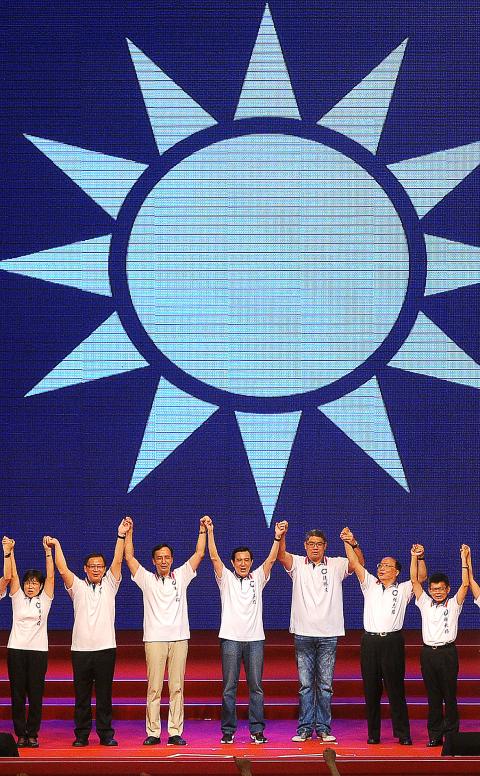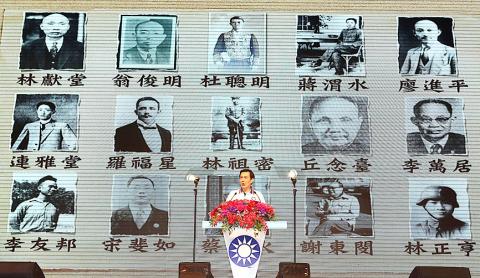President Ma Ying-jeou (馬英九), in his capacity as Chinese Nationalist Party (KMT) chairman, yesterday went on the offensive, aiming to boost support for the party in the Nov. 29 elections, charging that the Democratic Progressive Party (DPP) has hindered the nation’s progress.
In his speech at the KMT national congress held in Chiayi City, Ma accused the DPP of trampling on the democratic spirit of majority decisionmaking by occupying the podium at the Legislative Yuan 92 times over the past six years, preventing bipartisan dialogue and engaging in what he termed endless boycotts.
“This attitude of extreme conceit bent on excluding outsiders, humiliating officials and playing games with specific bills is the biggest crisis Taiwan currently faces,” Ma said.

Photo: Wang Min-wei, Taipei Times
Ma said the DPP used violent tactics that would not help solve any of the nation’s problems, adding that if the opposition party truly “loved Taiwan” as it said, it should cease actions that lead to infighting and wasting resources.
“Return to the true path of democracy and persuade the people with civilized conduct,” Ma said.
The public’s loyalty to the system far exceeds the interests of any political party, or concerns over an individual candidate’s success or failures at elections, Ma said, adding that such was the value of Taiwanese democracy and why the governments and people of the world have praised the nation for its peaceful transition of government.

Photo: CNA
Ma said that the DPP used “all sorts of reasons” to malign the rightful power of government accorded to the KMT by the Constitution and are attempting to bully the majority into submitting to the will of the few. Ma then accused the DPP of abusing its role as the opposition party.
Appealing to voters for support in the Nov. 29 elections, Ma said “The KMT is a party local to Taiwan, it is progressive and forward-looking, practical and responsible, and it is a diverse party that is willing to embrace changing times.”
Ma said that people spread across Taiwan, Penghu, Kinmen and Matsu might have come from different places and have different histories, but the acceptance of multicultural society is what makes Taiwan precious.
“The Aborigines may believe in ancestral spirits and rainbow bridges, the earlier Han immigrants remember the sadness inherent in their relocation to Taiwan, the people following the Nationalist government to Taiwan in 1949 remembered having to leave their homes and families behind, while the newer immigrants — such as foreign spouses — have the hope that over time this land will become their home,” Ma said, adding that “no matter who came first, no matter where we had come from, we are now all Taiwanese.”
“On this land, people of any culture and ethnicity are welcome to work side by side, to sweat and toil over the common goal of making Taiwan better; the embracing of multiple diverse cultures is the cornerstone of democracy,” he said.
“We are the most localized of all political parties,” Ma said, adding that “any supporter of the KMT would be able to walk tall and say: ‘I’m Taiwanese, I support the KMT.’”
In his speech, Ma also enumerated what the KMT has accomplished at the local, county and national levels.
The party’s members promoted competition capability for cities, encouraged the birth rate and introduced new vitality in business sectors through finding new investors, as well as increasing the number of jobs in cities where KMT members governed.
“We are telling the public by our actions and achievements that the KMT is better than the DPP at local government,” Ma said.
Additional reporting by CNA

The Central Weather Administration (CWA) yesterday said it expected to issue a sea warning for Typhoon Fung-Wong tomorrow, which it said would possibly make landfall near central Taiwan. As of 2am yesterday, Fung-Wong was about 1,760km southeast of Oluanpi (鵝鑾鼻), Taiwan’s southernmost point, moving west-northwest at 26kph. It is forecast to reach Luzon in the northern Philippines by tomorrow, the CWA said. After entering the South China Sea, Typhoon Fung-Wong is likely to turn northward toward Taiwan, CWA forecaster Chang Chun-yao (張峻堯) said, adding that it would likely make landfall near central Taiwan. The CWA expects to issue a land

The Central Weather Administration (CWA) yesterday said it is expected to issue a sea warning for Typhoon Fung-wong this afternoon and a land warning tomorrow. As of 1pm, the storm was about 1,070km southeast of Oluanpi (鵝鑾鼻), Taiwan’s southernmost point, and was moving west-northwest at 28 to 32kph, according to CWA data. The storm had a radius of 250km, with maximum sustained winds of 173kph and gusts reaching 209kph, the CWA added. The storm is forecast to pass near Luzon in the Philippines before entering the South China Sea and potentially turning northward toward Taiwan, the CWA said. CWA forecaster Chang Chun-yao (張峻堯) said

PREPARATION: Ferry lines and flights were canceled ahead of only the second storm to hit the nation in November, while many areas canceled classes and work Authorities yesterday evacuated more than 3,000 people ahead of approaching Tropical Storm Fung-wong, which is expected to make landfall between Kaohsiung and Pingtung County this evening. Fung-wong was yesterday morning downgraded from a typhoon to a tropical storm as it approached the nation’s southwest coast, the Central Weather Administration (CWA) said, as it issued a land alert for the storm. The alert applies to residents in Tainan, Kaohsiung, Pingtung and Taitung counties, and the Hengchun Peninsula (恆春). As of press time last night, Taichung, Tainan, Kaohsiung, and Yilan, Miaoli, Changhua, Yunlin, Pingtung and Penghu counties, as well as Chiayi city and county had

The Central Weather Administration (CWA) yesterday issued a sea alert for Typhoon Fung-wong (鳳凰) as it threatened vessels operating in waters off the Pratas Islands (Dongsha Islands, 東沙群島), the Bashi Channel and south of the Taiwan Strait. A land alert is expected to be announced some time between late last night and early this morning, the CWA said. As of press time last night, Taoyuan, as well as Yilan, Hualien and Penghu counties had declared today a typhoon day, canceling work and classes. Except for a few select districts in Taipei and New Taipei City, all other areas and city